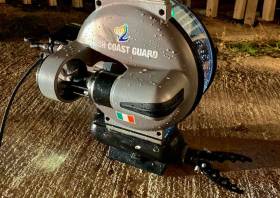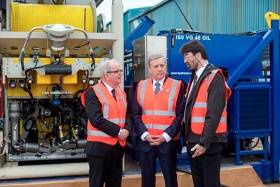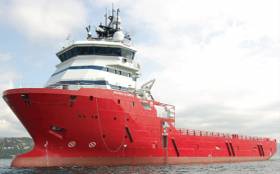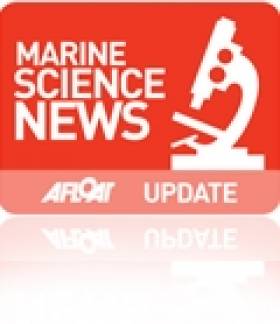Displaying items by tag: ROV
Marine Notice: University of Limerick ROV Trial in Irish Sea Near Kish Bank Lighthouse
Research survey TC22017 will be carried out in the Irish Sea in the vicinity of the Kish Bank Lighthouse by the University of Limerick (UL) in collaboration with the Marine Institute from this Sunday 11 to Friday 16 December, subject to weather and operational constraints.
The aim of this survey the testing and development of UL’s underwater ROV (remotely operated vehicle) system and automation platforms.
Ship-time will be focused on trialling comprehensive multi-disciplinary control and inspection methods, utilising new technologies to enable automated offshore asset inspection.
The primary outcome of the trials is to work towards the development of a framework and technique for the inspection of offshore assets remotely.
The survey will be conducted by the RV Tom Crean (callsign EIYX3) which will display appropriate lights and signals. The operations will take place between 7am and 7pm daily. The vessel will mainly run in DP mode while the ROV operates close to Kish Bank Lighthouse.
A map and coordinates of the survey area as well as contact details and a list of equipment used can be found in Marine Notice No 84 of 2022, attached below.
Howth Coast Guard Launches New Rescue ROV
Howth Coast Guard has successfully deployed its new remote operated vehicle (ROV) for the first time in a missing person exercise last night (Wednesday 30 October).
After several weeks of training, the coastguard team set out to locate a potential area of interest on the shore, and the rescue ROV was launched to conduct a sub-surface search.
An adult weighted target was then successfully located using the ROV camera and it was brought to the surface by the ROV using its gripping arm.
#SeaPower - The University of Limerick (UL) has unveiled a unique €2 million underwater robot adapted to inspect, repair and maintain marine renewable energy (MRE) facilities.
Funded by Science Foundation Ireland (SFI) through its Research Infrastructure Programme, the ROV Étaín can operate in challenging wind, wave, and tidal conditions.
Speaking at the launch of the robot at Limerick city docks yesterday (Thursday 26 April), Minister of State Pat Breen said: “Internationally, the offshore renewable energy sector is set to rapidly grow which will help to reduce carbon emissions and arrest climate change.
“Ireland has the best wind and wave resources in Europe and it is vital that as an island nation we invest and engage in research in the area of marine energy technology. Therefore, I'm delighted to today launch this ROV which will support Ireland's growing offshore renewable energy sector.”
Researchers at UL’s Centre for Robotics and Intelligence Systems (CRIS) have enhanced a commercially available ROV system (Forum Energy Technology’s Comanche ROV) with UL-developed advanced control software (OceanRings), precision navigation and flight control, state-of-the-art robotic imaging and sonar systems and fully automated manipulator systems.
These advanced features allow the robot to operate in the challenging environment of ocean renewable energy to support inspection, repair and maintenance operations.
Prof Daniel Toal, director of the Centre for Robotics and Intelligence Systems at UL, explained why the ROV Étaín was developed.
“Operation support in the MRE sector usually occurs on floating infrastructures so conditions are regularly beyond the capability and operating limits of commercial ROV technology. This means new smart ROV systems capability is necessary and that is what our team at UL has developed and launched today.”
UL’s Centre for Robotics and Intelligence Systems is part of the University College Cork-led SFI national Centre for Marine and Renewable Energy Ireland (MaREI).
The MaREI robotics lab at UL leads operations support engineering projects with industry partners such as Shannon Foynes Port Company, ESB, Ireland’s National Space Centre, SonarSim, Teledyne, Resolve Marine, CIL, IDS Monitoring and among others.
“The advanced robotics technology developed at UL will be crucial in supporting the burgeoning marine renewable energy sector,” said UL president Dr Des Fitzgerald. “It will also play a significant role in reducing the cost of installing and maintaining large-scale offshore energy generation infrastructure.
“As the worldwide marine renewable energy sector grows, UL's research contribution in this area will have even greater impact. I am particularly happy to see this advanced UL technology being developed, trialled and launched in Limerick city docks.
“The UL robotics base at the docks is just one of our commitments to grow and maintain strong links between the campus and the heart of Limerick city, with strategic partners like Shannon Foynes Port Company.”
Speaking about the project, Dr Ciarán Seoighe, deputy director general of Science Foundation Ireland, said the new ROV “will enhance our understanding of subsea exploration and marine renewable energy, placing Ireland at the forefront of advances in environmental research that are crucial to our country's future.”
Sailors Beware Of ROV Visual Survey Off South West Coast
#MarineNotice - Sailors and other mariners off the South West Coast should keep on the lookout for a visual survey by remote operated vehicle currently being undertaken by PSE Kindle Energy Ltd.
The survey, which was set to commence on Tuesday 9 May, will run for the next three weeks in the environs of the Kinsale Head Gas Field, subject to weather conditions, and is being carried out from the Skandi Olympia (Callsign C6XY8).
The vessel will have an ROV deployed close to the seabed and its travel rate (survey rate) is approximately 0.4 knots over the ground on a weather-dependent heading.
Regular safety messages will be broadcast on VHF Channel 16. All vessels, and particularly those engaged in fishing, are requested to give the Skandi Olympia a wide berth and keep a sharp lookout in the revenant areas, as detailed in Marine Notice No 19 of 2017, a PDF of which is available to read or download HERE.
In case of any doubt, call the vessel on VHF and a safe course to follow will be given.
Seeing the capabilities of Ireland's largest research vessel and the work of the Marine Institute, Mr Simon Coveney highlighted the importance the Marine Sector has on the Irish economy. "The seas and ocean that surround the land of Ireland is arguably one of our countries greatest natural resources. Through marine research, development and sustainable management, Ireland is developing a strong reputation as an emerging centre of excellence, where we have prominent roles in many European and international marine science bodies," he said.
Ireland's national research vessels RV Celtic Explorer and RV Celtic Voyager will record 627 days at sea between the two during 2011. Their work will range from fisheries surveys to underwater mapping and from climate studies to deepwater surveys with the remotely operated submersible ROV Holland 1.
"The work conducted on the vessels continues to feed into the success in attracting EU funding to Ireland's marine science programmes that have been achieved by our strategic approach to marine science planning" explained Dr Peter Heffernan, CEO of the Marine Institute.
"The award of funding projects shows that partnerships between academics and small businesses can yield significant dividends in creating jobs, generating economic revenue and the supply of raw materials for new industries ranging from ocean energy and environmental monitoring technologies to marine-inspired pharmaceuticals and food ingredients" he further said.































































